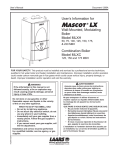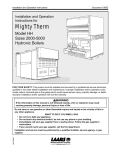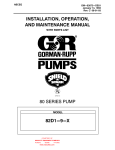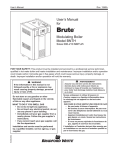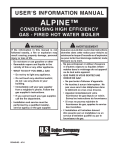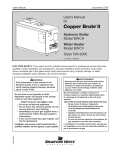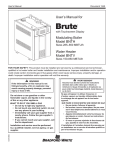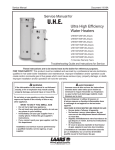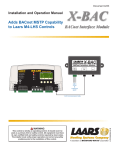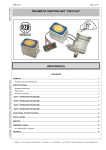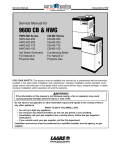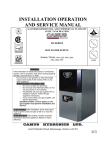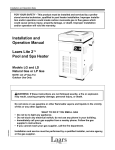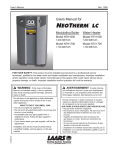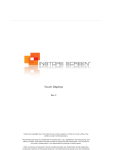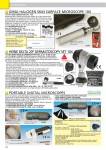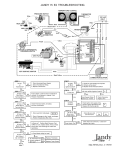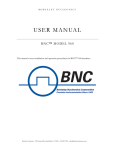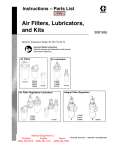Download MASCOT® II - g.mitchell
Transcript
User’s Manual Document 1239A User’s Information for MASCOT ® II Wall Mounted, Modulating Boiler Model LMH 125 MBTU/h Combination Boiler and Water Heater Model LMC 125 MBTU/h FOR YOUR SAFETY: This product must be installed and serviced by a professional service technician, qualified in hot water boiler and heater installation and maintenance. Improper installation and/or operation could create carbon monoxide gas in flue gases which could cause serious injury, property damage, or death. Improper installation and/or operation will void the warranty. WARNING If the information in this manual is not followed exactly, a fire or explosion may result causing property damage, personal injury or loss of life. Do not store or use gasoline or other flammable vapors and liquids in the vicinity of this or any other appliance. • • • • WHAT TO DO IF YOU SMELL GAS Do not try to light any appliance. Do not touch any electrical switch; do not use any phone in your building. Immediately call your gas supplier from a nearby phone. Follow the gas supplier’s instructions. If you cannot reach your gas supplier, call the fire department. H2338600A Installation and service must be performed by a qualified installer, service agency, or gas supplier. AVERTISSEMENT Assurez-vous de bien suivres les instructions données dans cette notice pour réduire au minimum le risque d’incendie ou d’explosion ou pour éviter tout dommage matériel, toute blessure ou la mort. Ne pas entreposer ni utiliser d’essence ni d’autres vapeurs ou liquides inflammables dans le voisinage de cet appareil ou de tout autre appareil. QUE FAIRE SI VOUS SENTEZ UNE ODEUR DE GAZ: • Ne pas tenter d’allumer d’appareils. • Ne touchez à aucun interrupteur. Ne pas vous servir des téléphones dansle bâtiment où vous êtes. • Appelez immédiatement votre fournisseur de gaz depuis un voisin. Suivez les instructions du fournisseur. • Si vous ne pouvez rejoindre le fournisseur de gaz, appelez le sservice des incendies. L’installation et l’entretien doivent être assurés par un installateur ou un service d’entretien qualifié ou par le fournisseur de gaz. Page 2 LAARS Heating Systems CONTENTS Familiarizing yourself to the Laars Mascot II.................2 1. Caring For Your Mascott II.........................................3 2. Filling, Shut Down and Restart................................3-4 3. Digital Display and Control.....................................5-7 FAMILIARIZING YOURSELF TO THE MASCOT II ® Figure 2. Location of Components. To open the front panels. Remove these two phillips screws, and fold lower door down. The middle panel will then also fold down. This will reveal the four screws that hold the upper panel in place. User’s Manual - Mascot II Boilers and Water Heaters 1. Caring For Your Mascot II Your Mascot II will require very little maintenance. However, as with any fine appliance there are certain steps that should be taken to ensure continuing optimum performance. 1.1 General Care Keep the area around the Mascot II clean and free from combustible materials, gasoline and other flammable liquids and vapors. The Mascot II must be completely isolated and protected from any source of corrosive chemical fumes such as trichlorethylene, perchlorethylene, chlorine, etc. Keep bottom and top openings on the boiler free for proper ventilation of interior components. Do not obstruct or block a free flow of air to the boiler to ensure proper ventilation. If desired, clean the jacket surfaces with a damp cloth and mild detergent. Do not use flammable cleaning materials. If sidewall vented, keep the vent terminal clear of obstructions — do not pile snow against the vent terminal. Clean the intake screen often, and then develop an appropriate maintenance schedule. 1.2 Annual Inspection of Flue and Vents Visually inspect the vent pipe once a year. Should any deterioration exist, have the affected parts replaced by a qualified service person. 1.3 In the Event of a Power Failure The Mascot II can not be operated during an electrical power outage. If there is an extended power outage with danger from freezing, then the Mascot II (and all other water systems) should be drained completely. When draining the boiler, turn off main electrical disconnect switch. When placing back in service, refer to Section 2 of this Manual for instruction. All draining and filling must only be done by a qualified service person. 1.4 Full Service Every Three (3) Years In addition to the annual visual inspections, a qualified service agency should conduct a detailed inspection of all flue product carrying areas of the boiler and its venting system. Page 3 2. Filling, Shut Down and Restart 2.1 Filling the Boiler System 1. 2. 3. 4. 5. 6. Ensure the system is fully connected. Close all bleeding devices and open make-up water valve. Allow system to fill slowly. Move manual lever on 3-way valve actuator to “open” position, allowing air to purge from boiler loop. Valve is normally in DHW position until there is a call for Central Heat via “T-T” contacts. If a water pressure regulator is provided on the make-up water line, adjust the pressure regulator to provide at least 12 psi (81.8 kPa) at the highest point in the heating loop. Open bleeding devices on all radiation units at the high points in the piping throughout the system, unless automatic air bleeders are provided at such points. Note that there is an air bleed located on the left side of Mascot II, on top of the jacket. Cycle the boiler pump on and off 10 times, 10 seconds on and 10 seconds off to remove all air from the heat exchanger. Then run system and appliance pump for a minimum of 30 minutes with the gas shut off. Using manual lever located on left side of 3-way valve actuator, move from “open” position back to closed position repeatedly. This process forces air out of the internal DHW loop. WARNING Failure to remove all air from the heat exchanger could lead to property damage, severe injury or death. 7. 8. Recheck all air bleeders as described in Step 4. Shut down the entire system and vent all radiation units and high points in the system piping, as described in Step 4. 9. Close make-up water valve and check strainer in pressure reducing valve for sediment or debris from the make-up water line. Reopen make-up water valve. 10. Check gauge for correct water pressure and then the system is ready for operation. 11. Refer to local codes and the make-up water valve manufacturer’s instructions as to whether the make-up water valve should be left open or closed. 12. After placing the unit in operation, the ignition system safety shutoff device must be tested. Page 4 Shut off the manual gas valve, and call the unit for heat. Main gas valve will be energized, attempting to light, for four (4) seconds, and then will deenergize. The unit will go into lockout after the required number of trial for ignition periods. Press the manual reset button on the boiler control, or the user display, open the manual gas valve and allow the unit to light. While the unit is operating, close the manual gas valve and ensure that power to the main gas valve has been cut. 13. Within three (3) days of start-up, recheck all air bleeders and the expansion tank as described in Steps 4 and 8 above. WARNING Improper adjustment may lead to poor combustion quality, increasing the amount of carbon monoxide produced. Excessive carbon monoxide levels may lead to personal injury or death. LAARS Heating Systems 2.2 Shutting Down Mascot II 1. 2. 3. This step to be performed by a qualified service person. 2.3 To Restart Mascot II 1. 2. 3. 4. 5. 6. 7. 8. WARNING Do not use this boiler if any part has been under water. Immediately call a qualified service technician to inspect the boiler and to replace any part of the control system and any gas control which has been under water. WARNING Should overheating occur or the gas supply fail to shut off, do not turn off or disconnect the electrical supply to the pump. Instead, shut off the gas supply at a location external to the boiler. FOR SERVICE Contact your installing contractor, gas utility, Laars dealer, or call Laars for the nearest authorized representative in your area. Turn off the main electrical disconnect switch. Close all manual gas valves. If freezing is anticipated, drain Mascot II and be sure to also protect building piping from freezing. All water must be removed from heat exchanger and condensate trap or else damage from freezing may occur. I f drained, please refer back to section 2.1 of this manual before restarting. Turn off the main electrical disconnect switch. Close all manual gas valves. WAIT FIVE (5) MINUTES. Set the aquastat or thermostat to its lowest setting. Open all manual gas valves. Reset all safety switches (pressure switch, manual reset high limit, etc.). Switch on electrical power. Burner will go through a prepurge period and ignitor warm-up period, followed by ignition. Page 5 User’s Manual - Mascot II Boilers and Water Heaters 3. Digital Display and Control MENU ITEM 3.1 Digital Display Navigation The Digital Display is centered in the middle of the User Interface and has 3 seperate modes of control. They are USER, SETUP and DIAGNOSTIC. The names of these modes gives you an idea of the levels of control. A USER might be the homeowner or a service technician. SETUP displays all the controls needed when setting up or expanding the boiler. And DIAGNOSTIC is intended for a Mascot ll trained technician. Please view Table 1, Table 2, and Table 3. USER Mode is the home screen shown on the control. If the display is not in USER Mode wait for the display timeout period to be reached or press the Done button to return to the USER Mode. SETUP Mode is accessed by holding the up and down arrow keys simultaneously for 3 seconds. DIAGNOSTIC Mode can be activated by a trained Mascot II technician. Once in a particular menu structure, navigation consists of pressing the next button to scroll from item to item and then pressing the up and down arrows to change values. Once the value is adjusted, the NEXT or DONE button can be pressed. DEFAULT — — Delta T — — DHW The Mascot II has an integrated electronic control that replaces many of the individual component controls found on older appliances. The control acts as the ignition control, pump control, high limit and cascading/ lead lag control and more. All of these functions and setups are managed through the Digital Display. RANGE Inlet water Displays the current inlet temperature water temperature Figure 3. The User Interface. FUNCTION Outlet water Displays the current outlet 55-180°F 120°F temperature water temperature & allows the setpoint to be adjusted Displays the current temperature rise across the heat exchanger Domestic Hot Water Caution Stack Displays the current stack temperature temperature — Outdoor Displays the current outdoor temperature air temperature — — Firing Rate — — Displays an indicator of the current firing rate based upon fan RPM. The actual firing rate may vary. — Table 1. USER Mode Menu. Caution Scalding Risk: Laars recommends the use of a thermostatic mixing valve at domestic hot water outlet (boiler location) to reduce potential for scalding. The following thermostatic mixing valve model has been tested and approved for Mascot II application: Honeywell AM100US-1. Contact Laars for additional recommended models. MENU ITEM DEFINITION F or C Selects temperature units LBTHODLOD Outdoor reset enable/disable enables menu items LBT Low boiler setpoint during outdoor reset HOD High outdoor temperature setpoint LOD Low outdoor temperature setpoint RMT Add Used for Lead/Lag (follow menus) LL Lead/Lag enable/disable - enables menu items HS Hysteresis - temp range between on/off cycles bL Base Load % - input rate before next boiler fires Sd Warm weather shut-down temperature ASC Anti short cycle - minutes of delay between startup bAC Future use - Press DONE to exit menu. PAS Future use - Press DONE to exit menu. NOTE: When enabling/disabling functions, select "Done" and wait 30 seconds before scrolling. Table 2. SETUP Mode Parameters. MENU ITEM DESCRIPTION Please view your Install/Operating Manual Table 3. DIAGNOSTIC Mode Menu. Page 6 3.2 Ignition Control- Sequence of Events 1. 2. 3. 4. 5. Call for heat Safety chain check Fan starts. Prepurge timer is started. Pre ignition time of 2 seconds to check the flame sensor operation and status. 6. Trial for ignition period, 4 seconds. The direct spark ignition switches to constant spark for three seconds, during which time the gas valve is open. For the last second of the ignition period direct spark is de-energized and the flame sensor checks for established flame. If flame is sensed the control enters “Run” to satisfy the demand. If flame is not established the control enters a retry, starting from step 2. If flame has not been established in the appropriate number of retries the control will lockout with a 109 error code. 7. Call for heat complete 8. Gas valve off 9. Fan and pump over run times active to purge the system The sequence is the same for DHW or Central Heat modes. Upon a call for Central Heat, the 3-way valve will shift position, allowing boiler water to enter the building’s heating loop. Only after the value shifts position will the firing sequence begin. 3.3 Modulation Control The control uses a PID algorithm to adjust the firing rate of the boiler as the control point is approached. The goal of the control is to operate at a minimum firing rate to match the load on the appliance. The burner modulates to achieve the setpoint temperature, away from the actual off point. 3.4 Pump Control The boiler pump is active anytime there is a call for heat applied to the control. When there is a central heat call supplied the system pump relay is active. If there is a DHW call supplied while the central heat call is active the system pump turns off. This happens because of domestic hot water priority, which forces the control to satisfy the domestic water demand prior to the hydronic demand. When the last heat demand is satisfied the boiler pump enters an overrun time. LAARS Heating Systems 3.5 High Limit The control uses a dual thermistor sensor to monitor the Mascot II’s maximum temperature. The high limit sensor is installed in the outlet water. A dual thermistor sensor is used, so that the two temperatures can be monitored and compared to confirm accuracy. The control will automatically reduce the firing of the Mascot II to prevent the high limit from tripping. The high limit setpoint is not adjustable. 3.6 Stack Temperature The stack temperature is a dual thermistor sensor and is limit rated. The control compares each of the temperature readings to determine accuracy. The stack sensor is used as a limiting feature to avoid excessive temperatures in the venting. 3.7 Domestic Hot Water Temperature The domestic hot water temperature sensor is used to control DHW temperature. The DHW setpoint can be adjusted through the USER menu structure. DHW setpoint is displayed during DHW mode. For LMH model, an aquastat will be used in lieu of a sensor to control temperature of an indirect tank. Caution Scalding Risk: Laars recommends the use of a thermostatic mixing valve at domestic hot water outlet (boiler location) to reduce potential for scalding. The following thermostatic mixing valve model has been tested and approved for Mascot II application: Honeywell AM100-US-1. Contact Laars for additional recommended models. User’s Manual - Mascot II Boilers and Water Heaters 3.8 Lead Lag / Cascading Lead Lag/Cascading allows multiple boilers to be connected together and controlled from one common sensor input. Up to 8 boilers can be connected together in a single system. To setup Lead/ Lag or cascading operation there are several settings in the “setup” menu structure that must be adjusted for the specific installation, each is covered in the following sections. 3.8.1 Lead Lag Setpoint The lead lag setpoint is set from the “user” menu using the “LL” variable. This is the temperature the boiler is attempting to maintain at the system sensor. This setting doesn’t control the boiler outlet temperature, so the water temperature at the boiler outlet may be much hotter than the system temperature setpoint. Adjust the LL setpoint to the desired operating temperature of the system. 3.8.2 Lead Lag Master/Slave Selection In the SETUP menu structure, the “LL” menu allows the lead lag system to be turned on and the boiler to be configured as a master or slave control. In each lead lag system there can only be one master control, so proper selection is important to avoid operating issues. To set the boiler to lead lag “master” operation the LL menu should be set to “LDR”. To set the boiler to slave, “SLA” should be selected. 3.8.3 Lead Lag Address The Lead Lag address must be set for each boiler connected to the lead lag system. Each boiler must have a unique address selected for the system to work properly. Typically, the lead or master boiler should be set to address one and the remaining boilers should be set to values 2–8 depending upon how many boilers are installed in the system. 3.8.4 Lead Lag Hysteresis The lead lag system uses a hysteresis value set in the setup menu, called, “HS”. The hysteresis and setpoint values control the on and off points of the boiler. If the lead lag setpoint is adjusted to 120°F with a hysteresis value of 5°F the boiler will turn off when the water temperature reaches 125°F and will turn back on when the water temperature reaches 115°F. Set the hysteresis values to match the boiler to the system operating characteristics. Setting this value correctly will help reduce the chance of short cycling. 3.8.5 Lead Lag Base Load Setting The lead lag system uses a base load setting that is set through the “setup” menu called “bL”. The base load setting identifies the firing rate that the operating boiler must achieve before the next boiler in the system is allowed to operate. The default setting is 50% to avoid short cycling and operating the boilers at higher, less efficient, firing rates. Page 7 LAARS Heating Systems H2338600A Page 8 800.900.9276 • Fax 800.559.1583 (Customer Service, Service Advisors) 20 Industrial Way, Rochester, NH 03867 • 603.335.6300 • Fax 603.335.3355 (Applications Engineering) 1869 Sismet Road, Mississauga, Ontario, Canada L4W 1W8 • 905.238.0100 • Fax 905.366.0130 www.Laars.com Litho in U.S.A. © Laars Heating Systems 1212 Document 1239A








